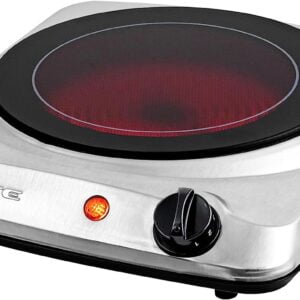Induction Stoves: The Modern Marvels of Efficient Cooking
Induction stoves are innovative and efficient cooking appliances that have revolutionized the way we cook. Instead of using traditional heating methods, these stoves employ electromagnetic technology to directly heat the cookware, offering precise temperature control and rapid cooking times. Induction stoves have gained immense popularity for their energy efficiency, safety, and cooking performance. Let’s explore the features, advantages, and considerations of induction stoves.
Features of Induction Stoves:
Induction Technology: Induction stoves use electromagnets to create an oscillating magnetic field. When compatible cookware is placed on the induction cooktop, the magnetic field induces an electric current within the cookware, generating heat directly in the pot or pan.
Cooking Zones: Induction stoves typically have multiple cooking zones or burners, each with its own control panel, allowing for simultaneous cooking with different heat settings.
Precise Temperature Control: Induction stoves offer precise and instantaneous temperature adjustments, providing precise control over cooking temperatures. This feature allows for precise simmering, searing, and delicate tasks like melting chocolate.
Fast Heating: Induction stoves heat up much faster than traditional electric or gas stoves, reducing cooking times significantly.
Energy Efficiency: Induction cooking is highly energy-efficient because the heat is generated directly in the cookware, leading to less wasted heat and quicker cooking.
Safety Features: Induction stoves are designed with safety in mind. They only heat the cookware, not the cooktop surface, reducing the risk of burns. Additionally, many induction stoves have automatic shut-off features for added safety.
Easy to Clean: Since the cooktop surface does not get hot, spills and splatters do not burn onto it. This makes induction stoves easy to clean with a simple wipe.
Advantages of Induction Stoves:
Rapid Cooking: Induction stoves heat up quickly, making them ideal for busy cooks who need to prepare meals in a short amount of time.
Energy Efficiency: Induction cooking is highly energy-efficient, saving both time and money on energy bills.
Precise Temperature Control: Induction stoves allow for precise temperature adjustments, providing better control over cooking results.
Safety: The absence of open flames and the cool cooktop surface enhance safety in the kitchen, reducing the risk of burns and fires.
Easy to Clean: The smooth, flat surface of induction stoves makes them easy to clean, and spills are less likely to stick to the cooktop.
Considerations for Induction Stoves:
Cookware Compatibility: Induction stoves require compatible cookware made of magnetic materials like cast iron or stainless steel. Non-magnetic cookware, such as aluminum or copper, will not work on induction cooktops.
Cost: Induction stoves are generally more expensive than traditional electric or gas stoves, but their energy efficiency and cooking performance may offset the initial cost over time.
Cooking Habits: Induction stoves may require some adjustment to cooking techniques compared to traditional stoves, as they heat differently.
In Conclusion:
Induction stoves are the modern marvels of the culinary world, offering efficient and precise cooking performance. With their rapid heating, energy efficiency, and safety features, they have become a favorite among home chefs and cooking enthusiasts alike. While induction stoves may require specific cookware and initial investment, their advantages in terms of cooking speed, energy savings, and safety make them a worthy addition to any kitchen. Embrace the future of cooking with induction stoves and enjoy the benefits of precision and efficiency in your culinary adventures.


